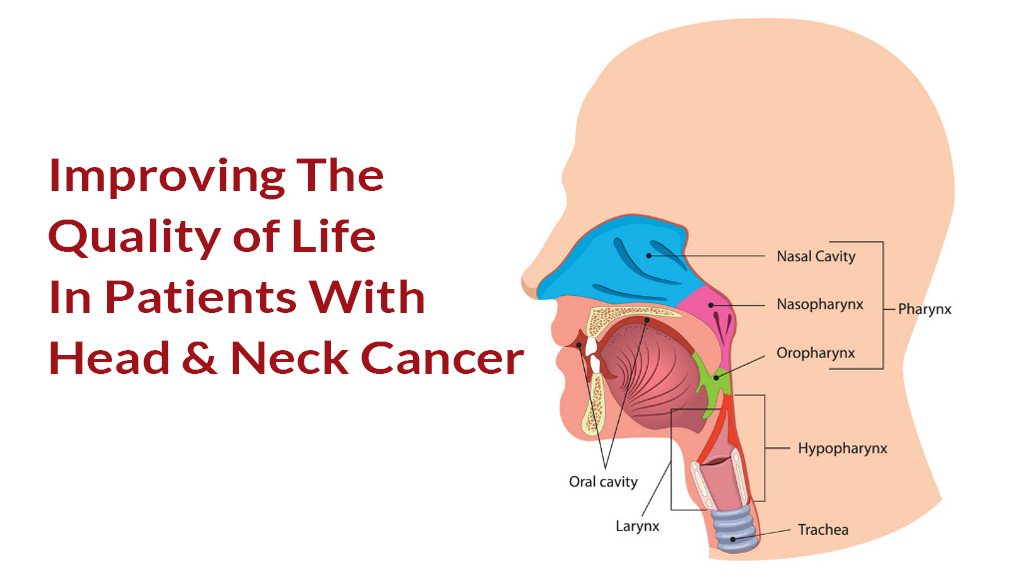Quality of Life is a multi-dimensional subjective notion that is a key consideration when it comes to head and neck cancer treatment.
HNCs can have a significant effect on patients. They affect not only their appearance, but also the underlying aspects of their life. The treatment impacts the way you breathe, communicate or even swallow. These adverse effects on the quality of life is crucial to consider during the survivorship period. Unacknowledged needs of the patient may significantly impact the emotional, physical and the social quality of life.
This blog will cover the meaning and importance of the quality of life(QoL) in HNC patients, along with the interventions and management of this critical aspect.
What Does Quality of Life in Patients With Head and Neck Cancer Mean?
Usually, we do not realize the importance of simple tasks like speaking, swallowing and eating during our routine lives. However, only when a serious disease like head and neck cancer deteriorates these functions, do we realize that oral health has a major role in our quality of life.
QoL includes a range of concepts, like physical functioning, role- body pain, general health perceptions, vitality, emotional and social functioning and psychological health. Moreover, there are strong connections between the specific QoL measurements before treatment and functional or survival outcomes for HNC patients.
All patients with cancer must achieve all aspects of QoL, i.e. Physical, Mental, Social & Functional Health. QOL is not an easy thing to gauge, but despite this there are various models and scales that help QOL in cancer patients. A good QOL can also increase longevity for cancer patients, letting them enjoy a more productive and social life. Thus, maintaining a good QOL should be a fundamental element of all cancer prevention and treatment.
Do Head and Neck Cancer Have Quality of Life?
Head and neck cancer can be a major factor in the quality of life of patients as many patients suffer long-term consequences.
-
During the treatment
The QOL often gets diminished after treatment, but gradually improves, but certain patients do not recover their prior treatment performance.
-
Long-term impacts
Many patients face constant symptoms, including dry mouth, issues with smell and taste, dental problems and more.
-
Emotional impact
Patients typically face a lot of emotional issues and their emotional functioning is usually the most affected.
-
Type of treatment
Patients who undergo surgery and radiotherapy could have greater severity of symptoms than patients who only have surgery.
Tips For Improving The Quality Of Life in Cancer Patients
Listed below are a few ways to move beyond the coping process and improve the quality of life in cancer patients:
-
Make a Survivorship Plan
The best cancer specialists work with cancer patients to design their Survivorship Care Plan. This basically consists of guidelines for helping patients to move forward and remain healthy following the cancer treatment. It has:
- A comprehensive description of the patient’s diagnosis and the treatment background
- Long-term and short-term potential side effects
- Strategies for managing the effects of symptoms and changes in the body
- Details for making healthy lifestyle modifications
- Support sources
- Contact details of the patient’s care team
The patient must expect to receive regular help and assistance even after the treatment plan gets completed. The patient must ensure to keep track of all appointments.
-
Participate In Physical Activities
Cancer treatment can be extremely difficult on the body and can cause nerve inflammation, swelling, exhaustion and weakness. Practicing physical activities can help patients in managing, reducing or eliminating issues. It allows patients to live a more comfortable life. These therapy include:
- Aerobic exercise
- Training for strength
- Soft tissue mobilization
- Massage therapy
- Stretching and strengthening
- Endurance training
If in doubt, take assistance from your cancer treatment team. Physical therapists can help patients regain their energy, decrease stress levels and increase endurance. They help them maintain the vitality they require to live fullest after cancer.
-
Follow Proper Nutrition
Having a balanced weight and diet can lower the chances of cancer returning. This can help prevent infections and speed up the healing process following surgery. Prefer making minor changes to your routine like avoiding processed foods, alcohol consumption, etc. that could drive big benefits.
Some cancer patients may face lingering changes in smell and taste, a decrease in appetite or weight gain as a result of inactivity or treatment for hormonal imbalance. To help these, patient must:
- Consume smaller portions of meals
- Add spices or seasonings to food items to enhance flavor
- Open window or turn on a fan to lessen nauseating smells
-
Connect With Fellow Cancer Survivors
Social connection is essential during the healing process following a cancer diagnosis or treatment. Many cancer patients may feel that their family members do not understand how you are feeling or would prefer not to put any stress on their personal relationships. This is where support groups come into the picture.
The feelings of vulnerability, anger, sadness, fear are normal and healthy reactions to cancer. The ability to connect with other cancer patients through support groups lets cancer survivors explore their feelings in a safe and honest manner. This is a reminder that they’re not alone in their journey.
Palliative Care In Improving Quality Of Life In HNC Patients
The quality of life gets severely affected by cancer in many ways. Physical signs like nausea, pain, constipation, breathing problems and emotional turmoil like anxiety, depression and fear, are all very real and can be a major obstacle for your routine life.
Palliative care and supportive treatments improves quality of life by addressing these symptoms.
Palliative care can help you feel better, whether you’re just beginning your cancer journey or a survivor or in between. Research shows that patients who benefit from palliative and supportive care tend to be healthier, experience improved pain control, feel relaxed and less stressed. The patients must receive palliative and support treatments earlier in their illness than later so that they can experience the most benefits of this therapy.
Expectations:
- Pain Management
- Emotional support like personal or family counseling to fight depression, anxiety, etc.
- Pastoral and Spiritual care
- Health planning to assist the family and you to create plans focused on your goals and needs, fulfilling financial considerations and long-term outlook.
Wrapping Up!
We tried our best to cover every relatable aspect about the quality of life in patients with head and neck cancer in this blog piece. At Samsara Cancer Care, we help improve the quality of life and enhance the satisfaction of both caregivers and patients. If you’re trying to manage your cancer and treatment journey, consult Dr.Sanjog Singh, an experienced professional in the field. The expert team assists patients with cancer and their families to feel better and have a greater enjoyment of life during this difficult time.










